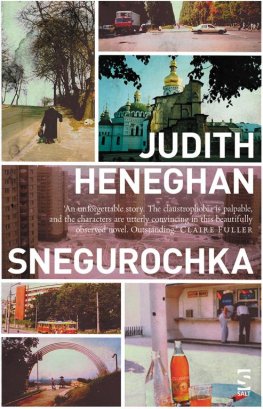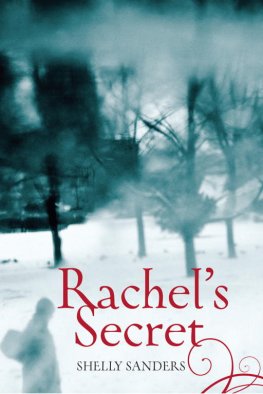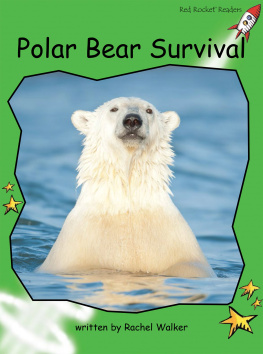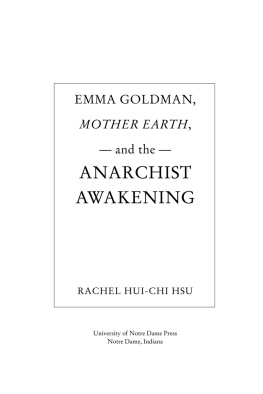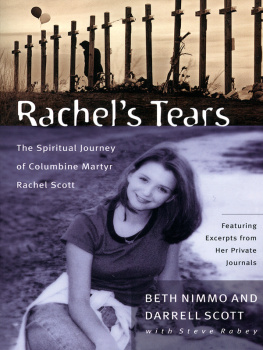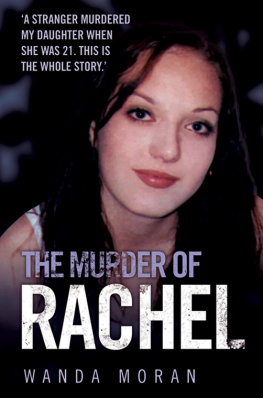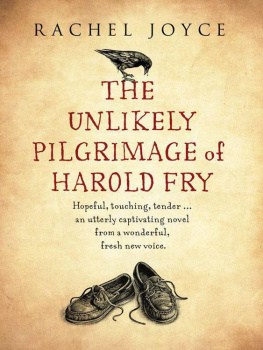Judith Heneghan
SENGUROCHKA
For Rory, Nellie, Jeremy and Meriel
I am talking about mercy, Woland explained his words, not taking his fiery eye off Margarita. It sometimes creeps, quite unexpectedly and perfidiously, through the narrowest cracks.
from
The Master and Margarita by MIKHAIL BULGAKOV

Kiev, October 1992
HIGH UP ON the fourteenth floor, a boy steps onto a balcony. He is twelve, maybe thirteen with slender limbs and shorn hair and he is naked apart from a pair of faded underpants. He scratches the bloom of eczema on his hip as he squints towards the neighbouring apartment block. No one is watching him. The steel hulk of the Motherland monument glints from her hillock across the valley, but she is a statue and her eyes are dead.
The boy moves to a pile of junk in the corner and yanks at a rusting bicycle until it breaks free from the chair leg that is jammed between its spokes. The bicycles chain has snapped, so he props it against the waist-high wall and hoists himself onto the seat, side-saddle, with one foot on a pedal. Now, perched there with his narrow shoulders hunched forward, one arm hugging the ledge, he waits.
Below him, the air hangs still between the tower blocks and the strand of fractured tarmac that winds down towards the Dnieper. His pale eyes flick across the hazy crenellations of the industrial zone on the horizon. He ignores, to his left, the green and gold canopies of the monastery on the hilltop with those silent, rotting cottages like windfalls at its feet. Instead, lizard-like, he is watching for movement: the cadets playing basketball between crooked hoops on their rectangle of parade ground inside the military academy, the dogs gnawing their rumps in a corner of the car park, and the women spilling out of a tram like spores down on Staronavodnitska Street.
The spores work their way across the waste ground along concrete paths that intersect at sharp angles. Here comes Elena Vasilyevna, the caretaker for Building Number Four. When her dark form disappears between the dump bins far below, the boy shifts on the saddle, leans out and cups his free hand to his mouth. One deep breath, then his jaw juts forward and he makes a sound like a dogs bark from the back of his throat. For a moment the sound splits the emptiness before it drops down the side of the building. The old woman reappears, her face turning in the wrong direction. The boy smiles, pleased at the effect.
Then, just beneath him, he notices something else.
The balcony on the floor below is glazed, unlike his own, and the glazing abuts the base of his balcony, which forms a roof. One of the windows is open and the smell of a cigarette rises up towards him. Freshly lit a Camel.
The boy stands up on the pedal and leans further over the edge. He cant see in through the glass below because the white sky is reflecting back at him, but a mans left forearm dangles out through the opening, fingers flicking ash.
Someone has moved in.
He studies the mans hand. The skin is pale with golden hairs. His shirt is unbuttoned at the wrist white cotton with thin blue checks. His watch is analogue with a leather strap, not metal. This man is in his twenties, maybe thirty, western, but probably not German or American. He wears a gold wedding band and when the arm withdraws a stream of smoke is blown out into the stillness.
The man says something, his voice muffled by the interior. Then a baby starts crying. Its mewls are a new sound, yet within seconds they seem to stake a claim on the building, seeping into the walls, travelling up through the concrete, the steel and the spaces in between.
This is the last day of summer. Tonight, the temperature will plummet and people will wake in the morning, sniff the wind and dig out their winter hats. For now, though, the boy remains balanced on the bicycle, a memory of warmth on his skin as the leaves drop silently from the rowans by the tramline, and the air cools, and the Englishman at the window below mutters to himself and lights another cigarette.
The foreign journalists say the city is holding its breath, but for Stepan it is one long exhalation.
* * *
Lucas, the golden-haired Englishman, and Rachel, his wife, are standing in the kitchen of their flat in Building Four, Staronavodnitska Street. It is a narrow room with a small table at the far end, in front of the window. The floor is covered in shiny brown linoleum and the walls are papered with a pattern of orange swirls. The laminated chipboard cupboards look new and theres a small freestanding stove in one corner.
Lucas is holding a Geiger counter.
The batteries are charged, he says, frowning at a leaflet. The switch is on. A pause. Nothing showing yet. He waves the device in a circle through the air before pointing it at Rachel. So that must be good?
Rachel stops biting the skin around her thumbnail and stares up at the ceiling, which is covered in the same swirling paper as the walls. Theres a noise above her head, a faint squeaking sound that travels backwards and forwards from the window to the hallway like the wheels of a hospital gurney.
Rach?
Rachel turns her gaze to her husband. I thought they gave you some training, she says.
The training was for Pripyat and Chernobyl. Lucas risks a smile. He has already spent five months in Ukraine, his first posting as a radio journalist on a retainer with the BBC World Service. Everyone agrees that it is perfectly safe for foreigners who werent in the danger zone when the reactor exploded back in 1986. Trust me, Rach, I wouldnt have brought you and Ivan out here if there were hotspots in the city.
Rachel stares at the gap beneath the stove. It is dark there, too dark to see underneath. This is her first day in Kiev. She arrived from London in the morning, frayed after the flight with their fifteen-week-old son. The airport felt hostile: people pressing all around, the threat of disease or some muttered sanction on their breath. The drive from Boryspil in a car with no seatbelts had done nothing to reassure her.
What about seepage underground? Try pointing it at the tap. The water comes from somewhere else. She leans across the stainless steel sink and raises the lever. Water gushes, then slows to a brown trickle. Theres a clanking sound in the pipework under the counter. Rachel makes a noise through clamped lips and folds her arms beneath her swollen breasts; her eyes are rimmed red with tiredness and Lucas tries not to notice the dark patch that is spreading across her shirt. Shes leaking again.
Hey, he murmurs, reaching for her hand. Itll be okay. Ill get Zoya to go through the instructions. Ill get the caretaker to sort out the taps. Until then weve plenty of bottled water. He looks down at his wife, at her sad, soft face with its high forehead and crooked nose and gently receding chin and feels, not for the first time, a flutter of panic in his chest. They havent seen each other for nine weeks because of doctors appointments and immunisations. Now he wishes shed tell him what shes really thinking: that she cant bathe their baby in brown water, even if its not radioactive; that the cot in which little Ivan has finally fallen asleep wont pass any British standards of safety; that an amber-coloured cockroach scooted under the bath when she went for a wee; that the flat is on the thirteenth floor and he shouldnt leave her to go out with his journalist friends tonight so that he can catch up on what hes missed while hes been fetching her from the airport. Perhaps nine weeks was too long. Or not long enough. Shes only been in Kiev for six hours and shes shutting down already. The thought makes him flap at the net curtains above the windowsill until he finds his cigarettes.

